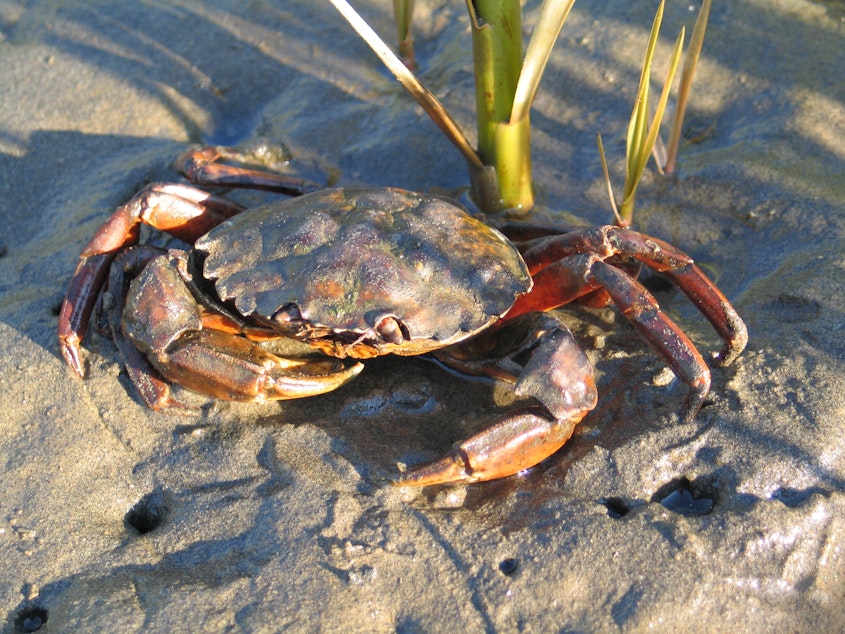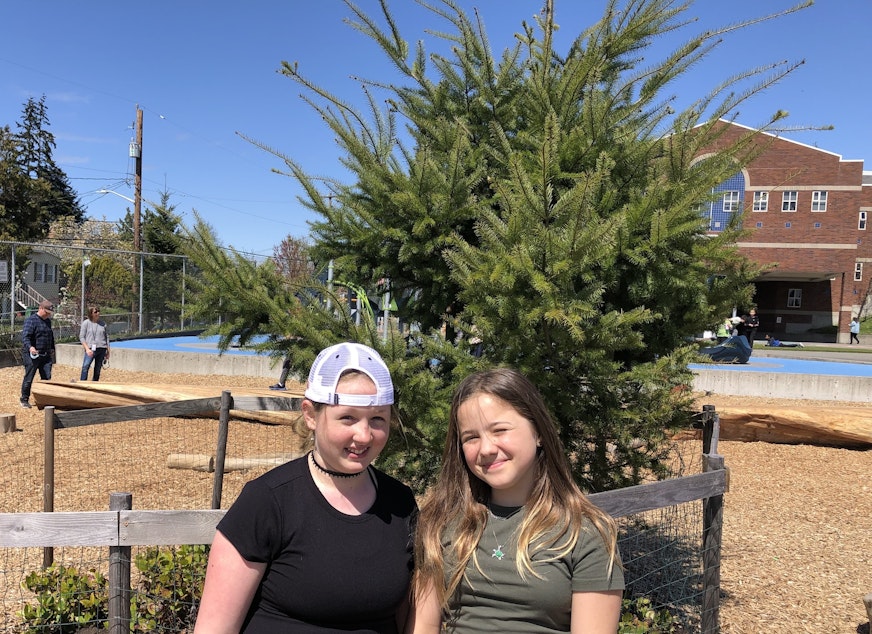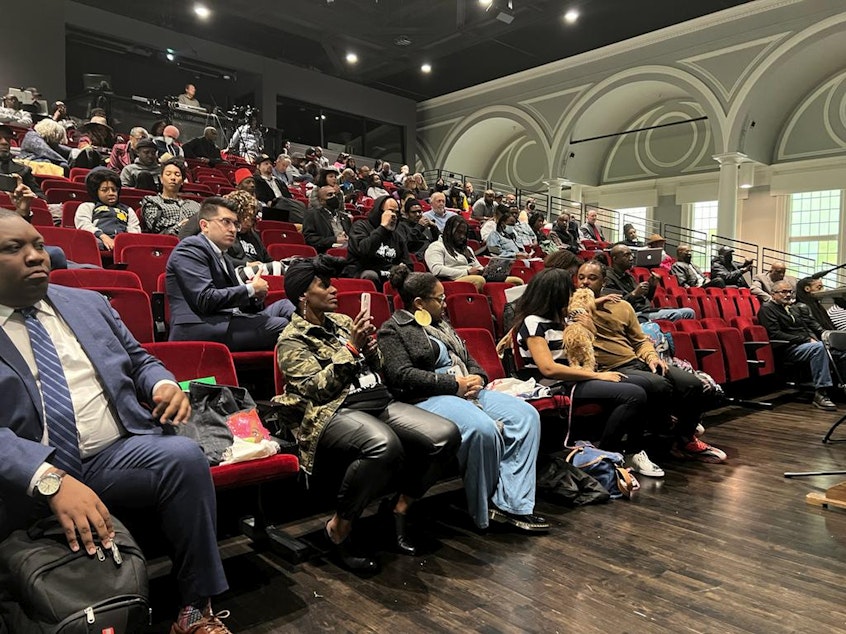Washington needs YOU to fight the green crab invasion: Today So Far

- Seattle hasn't had a new affordable housing apartment tower in 50 years ... until now.
- Washington needs YOU to fight the scourge of invading green crabs. Will you answer the call?
- Why salmon fishing in southeast Alaska is nixed this summer.
- Seattle police aren't ready for Washington's new police pursuit rules.
This post originally appeared in KUOW's Today So Far newsletter for May 8, 2023.
Seattle hasn't had a new affordable housing apartment tower in 50 years. Think about that for a minute. All these cranes in the air, all these new apartment buildings going up, jobs and people coming to town, and no affordable housing towers among it all. That is, until now.
The first such affordable housing tower in decades just opened up in Seattle's First Hill. It's the product of a rather unique circumstance. Sound Transit took ownership of the land years ago with the intention of building a light rail station at the site. That plan fizzled out, and Sound Transit was left with some prime First Hill property that it didn't have any use for. Enter Plymouth Housing and Bellwether Housing — two nonprofits with similar goals.
With their powers combined, today, a new high-rise tower is up and running in a thriving corner of Seattle. The building itself is split in half. Part of it is dedicated to helping people get off the streets and out of shelters. The other portion is geared more toward offering affordable costs to people who need it. The good part about that portion is that it can offer affordability in advance of potential problems arising, which in this city can result in people ending up on the street.
As KUOW's Joshua McNichols discovered, the result is a building where both someone who has spent years living on the street, and a medical student, can find a place to live. Read the full story here.
Washington needs YOU to fight the scourge of invading green crabs. Will you answer the call? In my head, I have an Uncle Sam type character pointing at us, telling us that we're needed for the battle at hand. The battle, in this case, is over the health of Puget Sound. Green crabs are advancing into local waters, where they are making things hard for our beloved Dungeness crabs, and other wildlife.
Sponsored
The Washington Sea Grant is joining forces with Washington State University Extension to start a volunteer program aimed at pushing back against the green crabs spreading throughout Puget Sound. It's an invasive species that wreaks havoc on local habitats and wildlife. There is a series of training events and more coming up soon. In short, take a hike, and join the fight.
So how exactly can you help? Check out the full story here.
While the message around Puget Sound is all about green crabs, if you travel up the Salish Sea into southeast Alaska, you'll begin to hear a range of voices arguing over salmon, orca, and the fishing industry.
"The cost of losing species is incalculable, therefore the species should be prioritized above other interests and priorities," said Brian Knutsen, an attorney with the Wild Fish Conservancy about salmon populations and the orca who rely on them for food. "They should be given the benefit of the doubt when you're weighing equities."
The conservancy just won a court battle, which will halt the upcoming summer and winter salmon fishing seasons in southeast Alaska. The short story here is that the U.S. National Marine Fisheries Services develops a plan every few years to manage the marine environment and fishing. Its plan in 2019 was to spend millions on habitat restoration and increased hatchery production to offset the harms that the fishing harvest would have on salmon populations around this part of Alaska. The conservancy challenged this plan in court, arguing that it didn't comply with federal regulations, and last week, a federal judge in Seattle agreed. This decision means that the government agency has to redo its fishing plans.
Sponsored
That's a lot of wonky legal talk, but it's important. While all this happens, commercial fishing is nixed in southeast Alaska.
"Over 1,500 fishermen directly participate in the fisheries," said Linda Behnken, who not only fishes in the region, she is director of the Alaska Longline Fishermen's Association. "It generates $148 million annually in economic output ... all that revolves around the harvest of salmon ... they are out for most of the summer fishing, coming in and delivering, going back out. Often family run, often with kids on board. Lots of multigenerational fishermen interested in handing off a healthy fishery to their kids for the next generation of young fishermen."
Behnken argues that fishing families have the greatest interest in the health of salmon populations, and that's why they have a "long history" working with conservationists and scientists to promote healthy oceans. The recent lawsuit, she says, harmed that effort.
"This lawsuit is a real distraction from the relationships we've built over decades between everyone who cares about maintaining wild salmon runs and recovering our wild salmon. To have this kind of a lawsuit tearing apart those relationships, distracting everybody from the work that really needs to be done, is incredibly counterproductive toward the bigger effort of saving our wild salmon, addressing climate change, taking care of habitat, and working together to accomplish these really big goals."
Folks would likely assume that this story is a simple industry-versus-conservancy legal battle. That's the cliché we've grown used to. But then you have voices like Professor Joseph Taylor, author of the book "Making Salmon." He comes at this from an entirely different angle. For the full conversation on this, check out today's episode of "Seattle Now."
Sponsored
The topic of police pursuits was a big issue during Washington's last legislative session. A few tweaks to the law were passed by lawmakers, which are now official, but it will take a while for Seattle police to sync up with the rules around police chases. For now, many officers have been instructed to hold off on pursuits.
That's because the recent tweaks include a requirement for training officers. The Seattle Police Department is a considerably large department, and hasn't gone through that training yet. So for now, Chief Adrian Diaz is telling officers that they can't do any car chases, until they have been trained. KUOW's Amy Radil has the full story here.
AS SEEN ON KUOW

Hawthorne Elementary fourth graders Anna, left, and Francie helped create and maintain a playground that replaced asphalt with new trees. The Seattle City Council is considering updates to its current tree regulations this month. One goal is to bring more trees to areas that lack them. Mayor Harrell’s proposal includes a “fee-in-lieu” program that would require people to pay into a tree-planting fund when they cut down trees on their property. (Amy Radil / KUOW)
Sponsored
DID YOU KNOW?
A lot of weird things get ditched on the side of the road. In my neighborhood you're likely to find a couch or an office chair. When I was a newspaper reporter on Bainbridge Island years ago, someone left a washing machine on the side of a road, and there was still wet laundry inside.
But I've never seen anything like what folks in New Jersey's Old Bridge Township are dealing with. Someone covertly dumped hundreds of pounds of pasta along the side of a creek recently. It's unclear if the pasta was already cooked when it was dumped, or if the rain softened things up. It took 15 wheelbarrows to haul away piles of spaghetti, macaroni, and other pasta favorites. Where is Joey Tribbiani when you need him?
It might seem like a very fusilli story, but locals argue it speaks to a larger, more serious problem. The city doesn't have any bulk garbage pick up. Some residents resort to dumping trash in remote corners of town. Many find it impastable to get rid of their garbage, and that has left locals feeling saucy.
ALSO ON OUR MINDS
Sponsored

A California panel has called for billions in reparations for descendants of slaves
California's reparations task force voted Saturday to approve recommendations on how the state may compensate and apologize to Black residents for generations of harm caused by discriminatory policies.




